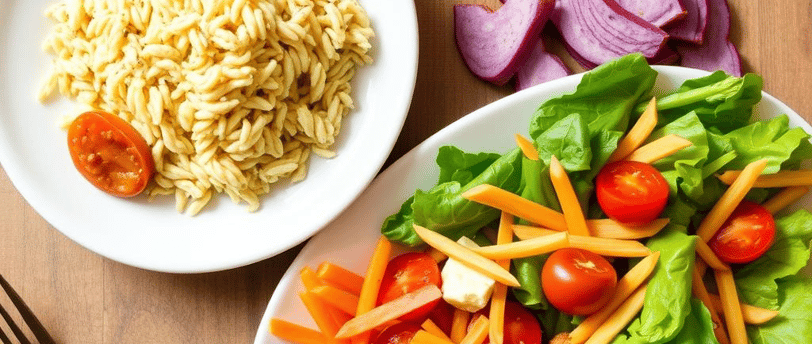Comparing Popular Diets: Which One Is Right for You?
🧘WELLNESS TIPS


In today’s world, where health and wellness receive more attention than ever, the quest for the perfect diet can feel overwhelming. With a myriad of options available—each promising rapid weight loss, better energy levels, and improved overall health—deciding which diet is right for you can be a daunting task. This article dives into some of the most popular diets out there, providing insights to help you make an informed choice. So, let’s go on a friendly journey through the world of diet trends!
1. The Ketogenic Diet
The ketogenic diet, or keto for short, emphasizes high-fat, low-carbohydrate intake. The goal is to enter a metabolic state called ketosis, where your body becomes efficient at burning fat for energy instead of glucose.
Pros:
Weight Loss: Many people report significant weight loss while on keto. It can also help reduce appetite by changing hunger-regulating hormones.
Improved Focus: Some adherents claim enhanced mental clarity and focus, likely due to the brain running on ketones instead of glucose.
Cons:
Restrictive: The strict limits on carbohydrates can make it challenging to stick with.
"Keto Flu": Transitioning into ketosis can lead to temporary flu-like symptoms, commonly known as the "keto flu."
Is it right for you?
If you're someone who enjoys high-fat foods and is committed to avoiding carbohydrates, the keto diet may be a good fit. However, if you struggle with food restrictions or are prone to unhealthy eating behaviors, it might be worth considering a different approach.
2. The Mediterranean Diet
Inspired by the eating habits of people in Mediterranean countries, this diet is rich in fruits, vegetables, whole grains, legumes, nuts, and healthy fats—primarily olive oil. It encourages moderate consumption of fish, poultry, and dairy while limiting red meat and sweets.
Pros:
Heart Health: Studies show that the Mediterranean diet can reduce the risk of heart disease, improve cholesterol levels, and even lower the incidence of type 2 diabetes.
Sustainability: Its diverse food options make it easier to adhere to long-term without feeling deprived.
Cons:
Less Structuring: For some, the lack of stringent rules can lead to confusion regarding portion sizes and food choices.
Is it right for you?
If you’re looking for a balanced approach to eating that focuses on whole foods and allows for occasional indulgences, the Mediterranean diet could be an excellent match.
3. The Paleo Diet
The Paleo diet, or "caveman diet," encourages eating like our ancient ancestors. It consists primarily of whole, unprocessed foods including meats, fish, fruits, vegetables, nuts, and seeds while eliminating grains, legumes, dairy, and processed foods.
Pros:
Whole Foods Focus: By emphasizing unprocessed foods, the paleo diet can lead to improved overall health and weight loss.
Anti-Inflammatory: Many followers see reduced inflammation and better gut health benefits.
Cons:
Exclusion of Food Groups: The strict limitations can be hard to sustain and may lead to nutritional deficiencies.
Is it right for you?
If you love the idea of getting back to basics and don't mind saying goodbye to grains and dairy, the paleo diet could work for you. On the flip side, if you value variety in your diet, this one may pose a challenge in the long run.
4. The Vegetarian/Vegan Diet
Vegetarians avoid meat, while vegans eliminate all animal products, including dairy and eggs. Both diets focus primarily on plant-based foods.
Pros:
Health Benefits: Research shows that plant-based diets can reduce the risk of chronic diseases, lower cholesterol, and support sustainable weight loss.
Environmental Impact: This diet is considered more sustainable, making it a popular choice for environmentally-conscious individuals.
Cons:
Nutritional Considerations: It can be challenging to get enough protein, vitamin B12, iron, and omega-3 fatty acids on these diets without careful planning.
Is it right for you?
If you love vegetables and want to improve your health while minimizing your carbon footprint, a vegetarian or vegan lifestyle could be a fulfilling choice. However, if you find it hard to give up animal products, consider a more flexible approach, such as plant-based eating or the "flexitarian" diet.
5. Intermittent Fasting
While not a diet in the traditional sense, intermittent fasting (IF) focuses more on when you eat rather than what you eat. Common methods include the 16/8 approach (fasting for 16 hours and eating during an 8-hour window) or alternate-day fasting.
Pros:
Simplicity: It can simplify meal planning since you only focus on eating during specific windows.
Weight Loss and Longevity: Some studies suggest it aids in weight loss and may enhance longevity by improving metabolism.
Cons:
Hunger Challenges: Some individuals find it difficult to fast, leading to potential overeating during eating windows.
Not for Everyone: Those with a history of eating disorders or specific medical conditions should consult a healthcare professional before starting.
Is it right for you?
If you prefer a flexible eating schedule and can tolerate some hunger, intermittent fasting might be a sustainable option. But if you have dietary restrictions or a relationship with food that could be impacted by fasting, it’s important to think carefully before proceeding.
Conclusion
Choosing a diet is a personal decision that should align with your lifestyle, preferences, and health goals. Whether you lean toward keto, Mediterranean, paleo, vegetarian, or intermittent fasting, remember that no one-size-fits-all solution exists. It’s essential to experiment, listen to your body, and perhaps even seek guidance from a nutritionist or healthcare professional.
Ultimately, the best diet is one that you can maintain and enjoy. So, take a deep breath, gather all the information you need, and find the right path for your health journey. Healthy eating isn’t just about the food on your plate, but about building a positive relationship with what you consume. Happy eating!
